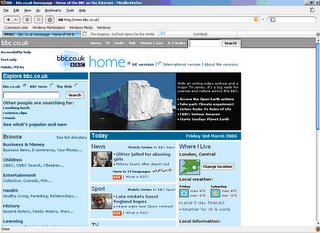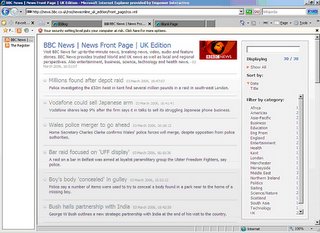Internet Explorer Enters the 21st Century
I started using Opera in the winter of 2000/2001. I was fed up of using IE because I was at work and happened to use the web to find a lot of information and found the clutter of opening up a new IE window annoying. I heard of this new browser so I downloaded it and discovered that it was fast and had tabbed browsing. More importantly the interface was nice and user friendly, and it had the advantage of having an integrated email client.
My workmates where impressed however some of my friends' were not. They complained about the advertising box and as soon as Firefox came out they started using that because you didn't have to pay to get it advert free. I found that pages didn't load as fast in Firefox but as more websites looked correct in Firefox than Opera, and I could view more sites in it I started using it more and more until it became my browser of choice on both operating systems I use.
However both browsers had the problem that some site owners decided to ban people from their site because they didn't use IE or Netscape 4. This obviously made logical sense to them but if you are a business why would you ban a customer if they asked for something that was easy to fix? In this case all the sites had to do was ensure their content was on text pages. The BBC website was one of the sites that adhered to this simple accessibility principle but as usual Microsoft, who have a habit of copying other companies technologies/ideas, decided to do this with their site. This prevented you from using windows update if you didn't use IE. This practice was forced to come to an end due to the Disability Discrimination laws making it clearly illegal to prevent people with disabilities i.e. those who used text readers from accessing your site. However not a lot of businesses realised that the practice had always been illegal in the UK.
In 2004/5 there were lots of scares about security holes in IE and so more and more people started using Firefox. However Opera lost out mainly due to it's advertising box on it's free edition, so late in '05 Opera decided to give away it's browser without the ads. (I personally think this is too late in the PC market.)
Firefox is currently at version 1.5 and has a lot of useful add-ons. These include search engine extensions for Dictionaries and Wikiapedia, adblockers, RSS readers and viewers for pages in IE both as a tab and outside Firefox.
However today I decided it was time to see what the new IE 7 looked like. I downloaded it which involved the tedious process of allowing Microsoft to check my operating system was a registered copy, and then let them scan my computer for malware. After a reboot I opened up some familiar sites and noticed something eerie.


Yes Microsoft has copied Firefox. The browsers look very similar in appearance.
What is worse Microsoft has even copied the Firefox idea of allowing extensions such as the Google Search Engine and Wikiapedia to be made for it and having an integrated RSS.


However Microsoft as usual ensures all the defaults go to Microsoft sites i.e. MSN for search and the only RSS channel is a blog on Microsoft.
The major problem is that sites don't render correctly in the browser including blogger so I will not be rushing out to install this browser on my home computer.

0 Comments:
Post a Comment
<< Home